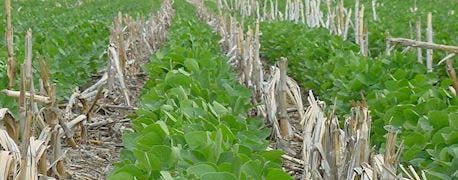April 8, 2015

Have you heard the hype about cover crops and wondered how much science is behind it? Quite a lot, it turns out, as a visit to the newly updated Midwest Cover Crops Council's online library reveals.
The council's recently updated list features more than 160 peer-reviewed research articles on a wide range of cover crop-focused topics dating back to 1973. Abstracts of those articles, which are listed in chronological order from most recent to oldest, are available for free.
"This collection of articles demonstrates the amount of good research that's being conducted right now on cover crops," says Dr. Matt Ruark, assistant professor of soil science at the University of Wisconsin. He says the uptick in research is a response to the growing number of questions farmers are asking about the costs and benefits of cover crops. "This research provides the scientific backbone for recommendations about cover crop management."

Extensive body of cover crop science available online
Questions researchers are trying to answer range from practical issues, such as how and when to establish and terminate cover crops, to economical and environmental questions on how cover crops affect cash crop yield, what impact they have on soil health and water quality, and if they sequester carbon.
Related: University Study: Use cover crops to lure deer from livestock feed
Nitrate loss from farmland – especially in Iowa's Raccoon River watershed, which supplies much of the drinking water for the City of Des Moines – is one question that has received considerable media attention. Several research articles in the MCCC library show that cover crops can significantly reduce nitrate losses from crop ground. Planting cover crops is one management option in Iowa's Nutrient Reduction Strategy that can help farmers reach nitrate reduction goals.
Cover crops are noted for their ability to reduce erosion, but much of the recent research on them has focused on the role they can play in improving the quality and health of the soil itself. "More and more results are being published from long-term research that show the beneficial impact of cover crops on soil quality," Ruark says.
Thinking About A Cover Crop? Start With Developing A Plan
Taking time to design your cover crop plan will increase the successful establishment of the crop and potentially allow for improved staggering of fall harvest.
Cover crops improve soil health by increasing microbial diversity, root diversity and soil organic matter. Increased organic matter has many other benefits, including an ability to resist soil erosion, increase water-holding capacity and help cash crops access nutrients in the soil
The Midwest Cover Crops Council is a coalition of members based in nine states and the Canadian province of Ontario. The goal of the MCCC is to facilitate widespread adoption of cover crops throughout the Midwest to increase the productivity of soil resources and improve the ecological, economic and social sustainability of farming systems.
You May Also Like




